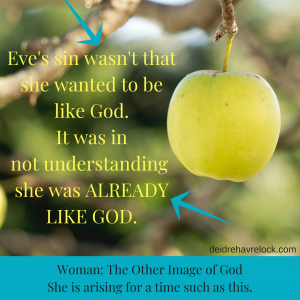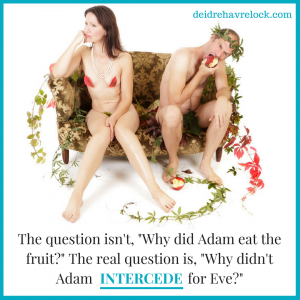 Foundational Teachings
Foundational Teachings
- There are two types of sin described in the Bible: unintentional sin and intentional sin.
- Eve’s sin was in being deceived (unintentional);
- Adam’s sin was that he knowingly chose (intentional) to follow another god;
- Only intentional sin leads to death; therefore, Adam birthed death.
“Therefore, just as sin came into the world through one man, and death came through sin, and so death spread to all because all have sinned—sin was indeed in the world before the law, but sin is not reckoned when there is no law. Yet death exercised dominion from Adam to Moses, even over those whose sins were not like the transgression of Adam, who is a type of the one who was to come.” —Rom. 5:12-14, NRSV
From the above scripture, take notice of these three things:
- sin came into the world through one man–Adam;
- sin was in the world before the law;
- death exercised dominion from Adam to Moses, even over those whose sins were not like the transgression of Adam.
Two Types of Sin in the Bible
To get to the heart of the Adam and Eve issue, let’s start with defining the two different types of sin that the Bible speaks about. The first is called unintentional sin. This type of sin is not directed against God—it needs only to be brought to light (a truth encounter) and then an intercessor must be available to forgive the sin:
When a ruler sins, doing unintentionally any one of all the things that by commandments of the Lord his God ought not to be done and incurs guilt, once the sin that he has committed is made known to him, he shall bring as his offering a male goat without blemish. He shall lay his hand on the head of the goat; it shall be slaughtered at the spot where the burnt offering is slaughtered before the Lord; it is a sin offering. The priest shall take some of the blood of the sin offering with his finger and put it on the horns of the altar of burnt offering, and pour out the rest of its blood at the base of the altar of burnt offering. All its fat he shall turn into smoke on the altar, like the fat of the sacrifice of well-being. Thus the priest shall make atonement on his behalf for his sin, and he shall be forgiven. —Lev. 4:22–26, NRSV
As you may or may not know, unintentional sin does not lead to death—it is not a mortal sin since it was not committed directly against God. However, the other type of sin does lead to death. The second type of sin is well… you guessed it—the intentional kind. Only intentional sin leads to death:
But whoever acts high-handedly [knowingly, willfully, obstinately], whether a native or an alien, affronts the Lord, and shall be cut off from among the people. Because of having despised the word of the Lord and broken his commandment, such a person shall be utterly cut off and bear the guilt. —Num. 15:30–31, NRSV (additions mine)
But the individual who acts deliberately, be he citizen or alien, commits an outrage against Yahweh, and such a man will be outlawed from his people. Since he has treated Yahweh’s word with contempt and has disobeyed his order, such a man will be outlawed absolutely and will bear the consequences of his guilt. –Num. 15:30–31, NJB
Intentional sin is greater than unintentional sin because this sin is against God. Remember the law of Moses: “But if your heart turns away [from God] and you do not hear, but are led astray to bow down to other gods and serve them, I declare to you today that you shall perish” (Deut. 30:17-18). Therefore, intentional sin is where one breaks covenant with God—knowingly and willfully in order to bow down to another god. In short, their heart has completely turned away from God.
Even the New Testament is clear about these two types of sin:
If you see your brother or sister committing what is not a mortal sin [such as unintentional sin], you will ask and God will give life to such a one—to those whose sin is not mortal. There is sin that is mortal; I do not say that you should pray about that. All wrongdoing is sin, but there is sin that is not mortal. —1 Jn. 5:16–17, NRSV (additions mine)
(1) Unintentional Sin is not a mortal sin since the heart of the person has not left God–Eve your heart never left God! Only the mind is affected. This type of sin requires truth to be applied so that the mind can realign with God’s truth; this type of sin still needs to be forgiven. (Which Jesus has done.)
(2) Intentional Sin is a mortal sin. This sin leads to death because the heart has left God and has chosen another god to bow down to. (Sorry Adam.) In this case, new life is needed. A completely new beginning is required to overturn death. (Which Jesus has done.)
*Adam and Eve are examples of these two types of sin. I am not saying that women are easily deceived and men’s hearts are more easily led astray. Ultimately, Adam’s sin birthed death for everyone… including Eve. Death trapped everyone after Adam fell. Death, therefore, “exercised dominion from Adam to Moses, even over those whose sins were not like the transgression of Adam.”
Eve’s Sin was that she was Deceived
For Adam was formed first, then Eve; and Adam was not deceived, but the woman was deceived and became a transgressor. —1 Tim. 2:13–14, NRSV
But I am afraid that as the serpent deceived Eve by its cunning, your thoughts will be led astray from a sincere and pure devotion to Christ. –2 Cor. 11:3, NRSV
Eve’s mind was targeted by Satan; her thoughts were led astray–not her heart. Eve believed the Serpent’s words…
But the serpent said to the woman, “You will not die; for God knows that when you eat of it your eyes will be opened, and you will be like God, knowing good and evil.” —Gen. 3:4-5, NRSV

When women continue to believe that Eve’s sin was in (wrongly) thinking she could become like God–pridefully raising herself up to a place she does not belong, the tragic result is self-depreciation, an undervaluation of oneself and one’s abilities based on perceived shame. But the truth remains–Eve was created, from the beginning, to be an image bearer, holding the same designation as Adam. Therefore, there was nothing more Eve needed to do but to say to Satan, “I have already been created to be like my God–there is nothing you could possibly offer me.”
Further Reading: Deconstructing the Sin of Eve
Adam’s Sin was Intentional
For Adam was formed first, then Eve; and Adam was not deceived, but the woman was deceived and became a transgressor. —1 Tim. 2:13–14, NRSV.
Adam was not deceived, which means he knew full well what he was doing—his sin was intentional. Of course, we are all told that Adam ate the fruit because of his intense love for Eve. You have probably heard this teaching before: the love Adam felt for Eve compromised his guidance and this proves the power of woman’s erroneous leadership skills and/or her somewhat dangerous influence over man. Ultimately, the weak-minded Eve led her devoted husband astray by convincing/enticing him to eat the fruit (*there is no biblical record of any form of enticement taking place), and once Adam fell—death entered the human race.
But the truth of the matter is far more heart-shattering than Eve leading Adam down the wrong path. The truth happens to be the same truth that the Bible continues to illustrate throughout the Old Testament: God gives humankind a law to test the heart. The human heart is not in love with God so humankind fails the test and the heart turns and embraces death.
Sin in the World Before the Law
“Sin was indeed in the world before the law, but sin is not reckoned when there is no law. –Rom. 5:14 (NRSV)
In order to understand and appreciate Adam’s sin, we must first understand the purpose of a law. We assume that sin entered our lives after Adam ate the fruit, but this isn’t the whole truth. Sin always exists before God gives a law. The law simply reveals what is hidden. But where was this sin? According to the scriptures, sin exists first in the heart:
For it is from within, from the human heart, that evil intentions come: fornication, theft, murder, adultery, avarice, wickedness, deceit, licentiousness, envy, slander, pride, folly. All these evil things come from within, and they defile a person. —Mk 7:21-23, NRSV
No one, when tempted, should say, “I am being tempted by God”; for God cannot be tempted by evil and he himself tempts no one. But one is tempted by one’s own desire, being lured and enticed by it; then, when that desire has conceived, it gives birth to sin, and that sin, when it is fully grown, gives birth to death. —Jas. 1:13-15, NRSV
Ultimately, Adam had an evil desire hidden within his heart — a desire to eat the fruit and join with death. Over time, this desire tugged at Adam’s heart until Adam gave in to it. When Adam decided to act on this evil desire then suddenly his sin was officially birthed. This particular sin then brought about death.
So God tests our hearts and minds in order to reveal to us what it is that we really value, desire and believe. How does God do this? Easy—“sin is not reckoned when there is no law.” Therefore, God establishes a law. *Notice, the law is not given to Adam because he is Eve’s leader. The law is given to test and reveal the state of the heart.
The One Law: Don’t Eat that Fruit!
The LORD God took the man and put him in the garden of Eden to till it and keep it. And the LORD God commanded the man, “You may freely eat of every tree of the garden; but of the tree of the knowledge of good and evil you shall not eat, for in the day that you eat of it you shall die.” —Gen. 2:15-17, NRSV
This one law which was given to Adam as a means to test the heart was rather simple: if you eat this particular fruit you will most definitely die. God wanted to know one thing, Does Adam’s heart truly love God who is life? Or does Adam’s heart want to align with death? Let’s stop for a moment and take some instruction from Moses and the Israelites because they went through the same kind of test:
The Lord made for them a statute and an ordinance and there he put them to the test. —Ex. 15:25, NRSV
See, I have set before you today life and prosperity, death and adversity. If you obey the commandments of the Lord your God that I am commanding you today, by loving the Lord your God, walking in his ways, and observing his commandments, decrees, and ordinances, then you shall live and become numerous, and the Lord your God will bless you in the land that you are entering to possess. But if your heart turns away and you do not hear, but are led astray to bow down to other gods and serve them, I declare to you today that you shall perish; —Deut. 30:15-18, NRSV
Here we have the Israelites’ law. Extremely similar to Adam’s law in that if the Israelites turn their hearts away from God (by choosing to disregard his law) and bow down to another god then they shall die. So same kind of law—but very different time periods.

Then Phinehas stood up and interceded, and the plague was stopped. And that has been reckoned to him as righteousness from generation to generation forever. —Ps. 106:30-31, NRSV
When we love someone–truly love them–then we intercede on their behalf (what we don’t usually do is join them in their sin); sometimes we intercede to the point of sacrificing ourselves (like Jesus did). After all, intercession is what restores a person to God when death has wrapped its grip around them. But that didn’t happen. Adam did not choose to intercede. Let me say this again, Adam did not choose to intercede for his God-given partner, Eve. And here lies our smoking gun in regard to what really went down in the Garden of Eden: at the point when intercession was the easiest and the most loving thing to do, Adam’s heart chose something (someone) else. Adam chose death.
The hidden desire that lurked in Adam’s heart had already taken root and now it came out in full force as Adam chose the serpent and death over a relationship with both God and Eve. And take notice, no persuasive words from Eve were needed:
And she also gave some to her husband, who was with her, and he ate. —Gen. 3:6, NRSV
At this point—once Adam ate—death set in. Adam, like Eve, was now under the authority of death. And there was no one left to intercede–both images and likenesses of God had bowed to death. Eve was tricked into bowing; and Adam chose to bow instead of interceding for Eve. The deal was done. Humanity’s fate was sealed. Death was embraced. Covenant was broken. It is as Hosea 6:7 says, “But at Adam they transgressed the covenant.”
Until Jesus–our faithful intercessor–showed up, that is:)



 Foundational Teachings
Foundational Teachings